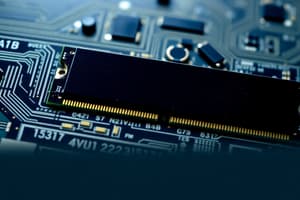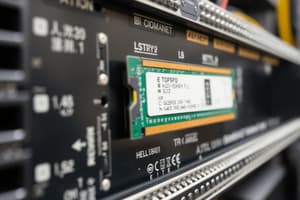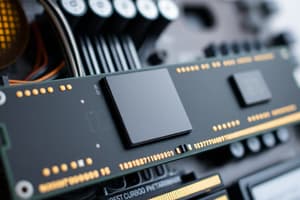Podcast
Questions and Answers
What are the main functions of keyboards and mice in a computer system?
What are the main functions of keyboards and mice in a computer system?
Input data into the system
Explain the purpose of printers and monitors in a computer system.
Explain the purpose of printers and monitors in a computer system.
Output data in a visible or physical format
Provide examples of peripherals that can be connected to a computer system.
Provide examples of peripherals that can be connected to a computer system.
Network cards, sound cards, external storage devices
What is the role of network cards in computer systems?
What is the role of network cards in computer systems?
How do sound cards contribute to computer systems?
How do sound cards contribute to computer systems?
Explain the importance of hardware in computer systems.
Explain the importance of hardware in computer systems.
What is the function of the Central Processing Unit (CPU) in a computer system?
What is the function of the Central Processing Unit (CPU) in a computer system?
Differentiate between volatile and non-volatile memory in a computer system.
Differentiate between volatile and non-volatile memory in a computer system.
What are some examples of input/output devices in a computer system?
What are some examples of input/output devices in a computer system?
Why is the CPU often referred to as the brain of the computer system?
Why is the CPU often referred to as the brain of the computer system?
Explain the importance of memory in a computer system.
Explain the importance of memory in a computer system.
How do CPUs contribute to the overall performance and reliability of a computer system?
How do CPUs contribute to the overall performance and reliability of a computer system?
Flashcards are hidden until you start studying
Study Notes
Introduction
Computer systems consist of both hardware and software components. Hardware is the physical part of the system, including the central processing unit (CPU), memory, input/output devices, and other peripherals. This article will focus on the hardware components of computer systems, discussing their functions, types, and importance in maintaining the overall performance and reliability of the system.
Central Processing Unit (CPU)
The CPU, also known as the microprocessor, is the brain of the computer. It performs logical and arithmetic operations, executes instructions from memory, and manages communication between different components of the system. CPUs are designed to be fast, efficient, and versatile, allowing them to handle a wide range of tasks with varying degrees of complexity.
Memory
Memory plays a crucial role in storing data and instructions for the CPU. There are two main types of memory: volatile and non-volatile. Volatile memory, such as random-access memory (RAM), is used for temporary storage of data that needs to be accessed quickly by the CPU. Non-volatile memory, such as read-only memory (ROM) or magnetic disks, stores data permanently, even when the power is turned off.
Input/Output Devices
Input/output (I/O) devices are used to communicate with the outside world. These devices include keyboards, mice, printers, scanners, and monitors. Keyboards and mice are used to input data into the system, while printers and monitors are used to output data in a more visible or physical format.
Peripherals
Peripherals are additional devices that can be connected to the computer to expand its functionality. Examples of peripherals include network cards, sound cards, and external storage devices. Network cards allow computers to communicate with each other over a network, while sound cards improve the audio capabilities of the system, and external storage devices provide additional space for storing data.
Importance of Hardware in Computer Systems
Hardware is essential for the proper functioning of computer systems. It provides the physical foundation upon which software can run, and it is responsible for executing instructions and manipulating data. By improving the hardware components of a computer system, users can enhance the system's performance, reliability, and overall capabilities, making it more efficient and effective in handling a wide range of tasks.
Conclusion
Understanding the hardware components of computer systems is essential for anyone working with or managing computers. By familiarizing yourself with the various hardware components and their functions, you can make informed decisions about upgrades, maintenance, and troubleshooting, ensuring that your computer system runs smoothly and efficiently.
Studying That Suits You
Use AI to generate personalized quizzes and flashcards to suit your learning preferences.




